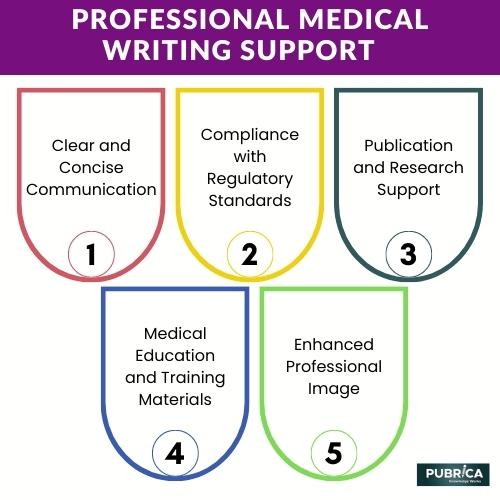Professional Medical Writing Support
An ethical requirement is the prompt and thorough reporting of clinical trial results. This promotes effective dissemination of research results, reduces duplication of effort and wasteful spending of research funds, enables researchers to create more current study hypotheses, and enables clinicians and patients to assess the advantages and disadvantages of various treatments. The quality, ethics, and timeliness of clinical trial reporting for both industry-funded and academically-funded trials remain under close scrutiny, despite the pharmaceutical industry's significant progress in addressing criticism of what is perceived as a lack of transparency in the disclosure of clinical trial results.
Introduction
When it comes to medical writing, precision, accuracy, and clarity are paramount. Whether you are a researcher, a healthcare professional, or a pharmaceutical company, effectively communicating scientific and medical information is crucial for advancing knowledge, disseminating research findings, and ensuring patient safety.
Professional medical writing support plays a vital role in achieving these goals. Here are a few key reasons why engaging the services of expert medical writers can benefit your work:

- Clear and Concise Communication: Medical writing involves translating complex scientific information into language that is easily understandable to a wide range of audiences, including healthcare professionals, regulatory agencies, and patients. Skilled medical writers excel in presenting technical concepts clearly and concisely, ensuring that the intended message is effectively conveyed without sacrificing scientific accuracy.
- Compliance with Regulatory Standards: In the highly regulated field of healthcare and pharmaceuticals, adherence to regulatory guidelines is crucial. Medical writers well-versed in regulatory requirements can help navigate through complex documentation processes, such as clinical trial protocols, investigator brochures, and regulatory submissions. Their expertise ensures that your documents are in line with the necessary guidelines and regulations, reducing the risk of delays or rejections.
- Publication and Research Support: For researchers, getting their work published in reputable journals is essential for dissemination and recognition. Medical writers can provide invaluable assistance in preparing manuscripts, abstracts, and posters, adhering to specific journal guidelines and ensuring the highest standards of scientific writing. Additionally, they can assist with systematic literature reviews, data analysis, and meta-analyses, enhancing the credibility and impact of your research.
- Medical Education and Training Materials: Healthcare professionals and pharmaceutical companies often require educational materials, such as slide decks, training modules, and patient information leaflets. Medical writers can help develop these materials, ensuring accuracy, consistency, and accessibility. They have the ability to distil complex medical concepts into comprehensive and engaging content that meets the needs of diverse audiences.
- Enhanced Professional Image: Engaging professional medical writers signals a commitment to quality and professionalism. Clear and well-written documents reflect positively on your organization or research team, instilling confidence in stakeholders and facilitating effective communication within the medical community (1).
Conclusion:
In conclusion, professional medical writing support is valuable for researchers, healthcare professionals, and pharmaceutical companies. With their expertise in scientific communication, regulatory compliance, and manuscript preparation, medical writers contribute to advancing knowledge, improving patient care, and succeeding healthcare initiatives. By leveraging their skills, Pubrica can ensure that your medical documents are accurate, well-structured, and impactful, ultimately contributing to the overall success of your work in the medical field.
Give yourself the Medical edge today
Each order includes
- On-time delivery or your money back
- A fully qualified writer in your subject
- In-depth proofreading by our Quality Control Team
- 100% confidentiality, the work is never re-sold or published
- Standard 7-day amendment period
- A paper written to the standard ordered
- A detailed plagiarism report
- A comprehensive quality report

